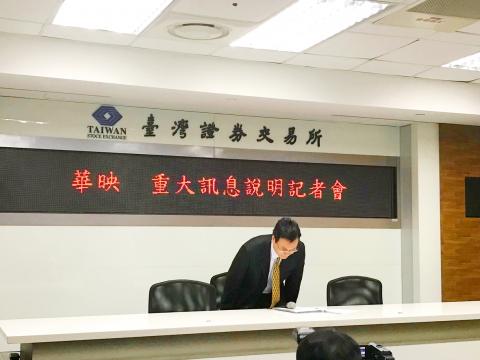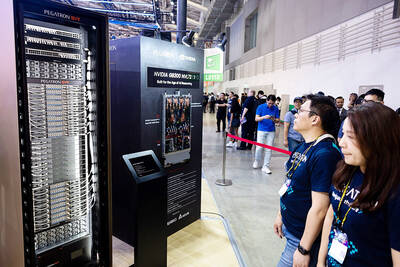Financially troubled LCD panel maker Chunghwa Picture Tubes Ltd (CPT, 中華映管) yesterday said that its book value slid into the red last year, pushing the stock to the brink of being delisted from the stock market.
CPT is the second subsidiary of local home appliances maker Tatung Co (大同) to face the imminent risk of having its shares banned from trading in the near future, following Green Energy Technology Inc (綠能科技).
The LCD panelmaker saw losses balloon to NT$17.73 billion (US$574.6 million) in the final quarter of last year, from losses of NT$2.61 billion in the previous quarter, dragged by a persistent industry oversupply and impairment losses from its 26 percent shareholding in CPT Technology Group Co (華映科技).

Photo: Chen Mei-ying, Taipei Times
For the full year, CPT posted losses of NT$19.61 billion, a reversal of net profits of NT$2.99 billion in 2017.
As a result, the company’s book value deteriorated to minus-NT$0.7 per share, from NT$2.19 a share in 2017.
CPT is likely to be delisted from the Taiwan Stock Exchange in the middle of May at the earliest, 40 days after the company submits its financial results to the exchange.
Regulations ban listed companies from trading on the stock market if their net value falls into the red.
CPT has about 244,000 shareholders, who are likely to see their holdings become worthless following the delisting.
“The company is in a difficult financial situation due to the LCD industry supply glut in 2018 and [adverse] impact from the US-China trade dispute,” company spokesperson Huang Shih-chang (黃世昌) told a media briefing in Taipei.
As of Dec. 31 last year, the Taoyuan-based firm’s debt had reached NT$36.6 billion, including NT$1.3 billion in severance payments, as it plans to lay off 2,500 workers.
The company submitted a restructuring proposal to the Taoyuan District Court, but the court has rejected the plan.
CPT said it has resumed operation of a 4.5G and a 6G fab, with equipment loading running at a low 10 to 20 percent, Huang said.
The company had idled a 4.5G line in 2013.
The company plans to sell the two 4.5G lines to fund the operation of the 6G fab upon receiving approval from the court, he said.
The company is restricted from selling the fabs as it is in the process of applying for court receivership.
Tatung yesterday said it has recognized losses of NT$9.9 billion from its shareholdings of CPT and Green Energy.
As a result, Tatung saw its losses widen to NT$33.29 billion last year, after losing NT$4.09 billion in the first three quarters of last year.
The home appliance maker saw its book value drop to NT$14.5 per share.

AI TALENT: No financial details were released about the deal, in which top Groq executives, including its CEO, would join Nvidia to help advance the technology Nvidia Corp has agreed to a licensing deal with artificial intelligence (AI) start-up Groq, furthering its investments in companies connected to the AI boom and gaining the right to add a new type of technology to its products. The world’s largest publicly traded company has paid for the right to use Groq’s technology and is to integrate its chip design into future products. Some of the start-up’s executives are leaving to join Nvidia to help with that effort, the companies said. Groq would continue as an independent company with a new chief executive, it said on Wednesday in a post on its Web

RESPONSE: The Japanese Ministry of Finance might have to intervene in the currency markets should the yen keep weakening toward the 160 level against the US dollar Japan’s chief currency official yesterday sent a warning on recent foreign exchange moves, after the yen weakened against the US dollar following Friday last week’s Bank of Japan (BOJ) decision. “We’re seeing one-directional, sudden moves especially after last week’s monetary policy meeting, so I’m deeply concerned,” Japanese Vice Finance Minister for International Affairs Atsushi Mimura told reporters. “We’d like to take appropriate responses against excessive moves.” The central bank on Friday raised its benchmark interest rate to the highest in 30 years, but Bank of Japan Governor Kazuo Ueda chose to keep his options open rather than bolster the yen,

Global server shipments are expected to surge to 15 million units next year, from 4 million units this year, with artificial intelligence (AI) servers accounting for about 30 percent, driven by massive capital spending by major cloud service providers, the Market Intelligence and Consulting Institute (MIC) said on Thursday last week. Major cloud service providers — including Google’s parent company Alphabet Inc, Microsoft Corp, Amazon.com Inc and Meta Platforms Inc — are projected to budget US$450 million for capital expenditure next year, up from US$400 million this year, MIC ICT [information and communications technology] Industry Research Center director Edward Lin

Even as the US is embarked on a bitter rivalry with China over the deployment of artificial intelligence (AI), Chinese technology is quietly making inroads into the US market. Despite considerable geopolitical tensions, Chinese open-source AI models are winning over a growing number of programmers and companies in the US. These are different from the closed generative AI models that have become household names — ChatGPT-maker OpenAI or Google’s Gemini — whose inner workings are fiercely protected. In contrast, “open” models offered by many Chinese rivals, from Alibaba (阿里巴巴) to DeepSeek (深度求索), allow programmers to customize parts of the software to suit their